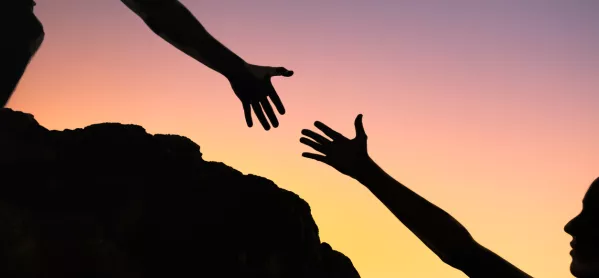At times of crisis, we naturally draw inspiration from the moments throughout our history where we have faced great hardship and difficulty.
But where the build-up to the great wars of the previous century were an escalation of tensions that reached breaking point, the spread of coronavirus has been shocking in its pace.
A week that began with people being encouraged to work remotely ends with the effective closure of tens of thousands of schools. A few days later, the entire country is in lockdown.
People have had little time to prepare for the upheaval that has already occurred, or that is to come.
The sheer number and scale of the issues facing each and every one of us has created a feeling of widespread anxiety.
Endless fears
For heads and teachers at schools across the country, their fears seem endless right now: for their own health, as well as that of their friends, family, staff and pupils; for the education of young people who will not attend school for an indeterminate length of time; for the missed end-of-year celebrations that so many have looked forward to; and for the emotional and physical impact on vulnerable children.
They fear the cancellation of exams could leave pupils demoralised and uncertain at a critically important stage of their development.
And, for independent schools - the majority of which are small, and not wealthy organisations - there is the fear that loss of fees will be financially crippling.
At times of great national crisis, independent schools and our alumni have always been a crucial part of the effort. The outbreak of Covid-19 is no different. I have been heartened by the conversations I’ve had with heads, teachers and parents who have inundated me with ideas about how we can play a role in helping our neighbours and communities at this time.
People understand this is a moment where we must all do what we can, despite the uncertainty facing us. I have been inspired by schools arranging for their facilities to serve as drop-off points for donations, or asking their pupils to get involved in community efforts and to check in on isolated or elderly neighbours.
The spirit of our times
Research this week showed that state schools are less prepared than independent schools to operate distance learning. The news that a tiny independent school in Sidcup has offered to help its state neighbour build an online-learning platform is a perfect demonstration of the spirit of our times.
Francis Holland School in London delivered hundreds of pounds’ worth of perishable food items to a local community charity, upon announcement of its impending closure. A-level design and technology students from Trent College in Nottinghamshire this week announced that they have developed a virus protection shield for doctors at their local hospital. Across the country, schools are rolling up their sleeves and joining the fight, despite their own worries.
The independent sector stands ready to help, however we are able to. With responsibility for the education of more than half a million pupils, we have a significant role to play, and we want to be part of the government’s plans.
Like many others at this time, we need to have urgent conversations with ministers about how we ensure our sector is able to get through this period.
But at the same time, it is incumbent upon us all to be at the heart of the national effort to tackle the challenges before us. Let’s take this opportunity to work closely together in the weeks and months ahead.
Julie Robinson is CEO of the Independent Schools Council and a former headteacher




